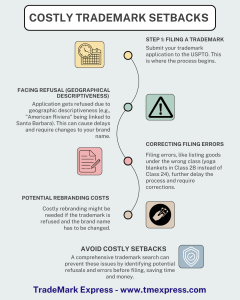Comprehensive Trademark Services Could Have Prevented Meghan Markle’s Costly Filing Mistakes
Comprehensive trademark services could have prevented Meghan Markle's costly filing mistakes, highlighting the need for thorough searches before filing.
LOS ALTOS, CA, UNITED STATES, September 18, 2024 /EINPresswire.com/ -- Meghan Markle’s recent trademark rejection for her “American Riviera Orchard” brand highlights the importance of conducting a truly comprehensive trademark search before filing. Markle’s team encountered significant issues that could have been foreseen and avoided with a thorough search, including a geographic descriptiveness refusal and misclassifications in her application.In August 2024, Markle’s application for “American Riviera Orchard” was partially refused by the U.S. Patent and Trademark Office (USPTO), citing that the term "American Riviera" is geographically descriptive. According to the USPTO, “The attached evidence… demonstrates that the term ‘AMERICAN RIVIERA’ identifies a particular geographic place, namely, Santa Barbara, California.”
A comprehensive trademark search, specifically analyzing previously filed and abandoned marks, could have raised this issue early. For example, just six months before Markle’s application, American Riviera Art (Serial Number 98170111) received a refusal for the same reason: “A product that is produced or a service that is provided near the geographic place named in the applied-for mark is sufficient to support a finding that the goods and/or services originate in that geographic location.”
Furthermore, a common law search, which includes broader internet research, would have uncovered that Santa Barbara has long been dubbed “The American Riviera,” as noted on Wikipedia. Armed with this information, Markle’s team could have pivoted to a more distinctive brand name, avoiding the costly possibility of rebranding at a late stage.
Markle’s team also ran into issues with the word “Orchard” in the trademark application. The USPTO flagged "Orchard" as merely descriptive for products like jellies and dried fruit as well as for retail sales, as it’s commonly associated with providers of such goods. A truly comprehensive search would have identified this potential issue, allowing Markle’s team to reconsider the name and avoid the risk of refusal and further delays.
In addition to these descriptive and geographic issues, Markle’s application also included misclassifications. The application listed yoga blankets and meditation blankets in International Class 28. However, these items have not belonged to that class since January 2023; instead, they should have been filed under Class 24. Markle’s team filed the application in March 2024, more than a year after this change, underscoring the importance of staying updated on classification requirements to avoid unnecessary hurdles.
This situation showcases how a comprehensive trademark search and expert guidance before filing can prevent costly mistakes, refusals, and delays. Meghan Markle’s case highlights the critical need for accurate, exhaustive trademark services that cover every angle—geographical descriptiveness, descriptive words, and proper classification.
For those looking to secure a trademark, don’t leave it to chance. Contact TradeMark Express for comprehensive trademark search services that can help you avoid potential pitfalls and secure your brand with confidence.
Chris DeMassa
TradeMark Express
+1 650-948-0530
staff@tmexpress.com
Visit us on social media:
Facebook
X
LinkedIn
Instagram
YouTube
Other
Legal Disclaimer:
EIN Presswire provides this news content "as is" without warranty of any kind. We do not accept any responsibility or liability for the accuracy, content, images, videos, licenses, completeness, legality, or reliability of the information contained in this article. If you have any complaints or copyright issues related to this article, kindly contact the author above.

